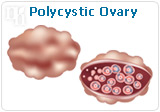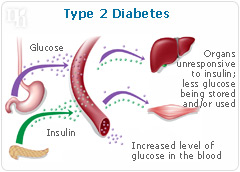
Polycystic ovary syndrome (PCOS) is a condition whereby small cysts appear in a woman's ovaries and cause an imbalance in the production of sex hormones, namely estrogen and progesterone. Testosterone, an androgen, is present in women in small amounts, but is overproduced in women suffering from this condition.
The cause of PCOS is still uncertain, but it often begins in early reproductive years and is regularly detected after substantial weight gain. Some studies suggest that PCOS may be hereditary, so if your sister and mother have developed this complication, you may be at risk too.
Other warning signs of PCOS include:
- Insulin abundance. Excess insulin has been linked to the overproduction of testosterone and other androgens.
- Low-grade inflammation. Inflammation is the name given to the process of the stimulation of white blood cells in your body to produce chemicals to fight infection. When inflammation is triggered, substances that can lead to insulin resistance may also be produced. This condition is common among sufferers of PCOS.
- Overexposure to androgens in the womb. Research has begun to suggest that exposure or overexposure to certain types of hormones during gestation may have an effect on the way the body functions far into the future. When it comes to too much testosterone in the womb, a woman may be predisposed to masculine fat distribution and other “male” traits later in life that are associated with PCOS.
Symptoms of PCOS
If you suffer from the following list of traits associated with PCOS, you may want to make an appointment with your doctor.
- Acne. Often on the face or body.
- Excess hair growth. In areas most often associated with masculine hair growth and associated with an overabundance of testosterone.
- Thinning hair on the head. Also associated with elevated androgen levels.
- Depression. Often results from the fluctuation of hormone levels. Irregular periods or absence of ovulation. Due to the disturbed interaction with other sex hormones.
Complications of PCOS
PCOS can develop into more serious health conditions including:

- Type II diabetes
- High blood pressure
- Liver problems
- Sleep apnea
- Endometrial cancer
- High blood pressure
- Obesity
Recommendations
PCOS can lead to infertility or other more serious health conditions. Receiving early treatment may prevent the development of diabetes, heart disease, and even stroke. Talk to your doctor if you suspect you might be suffering from PCOS.

